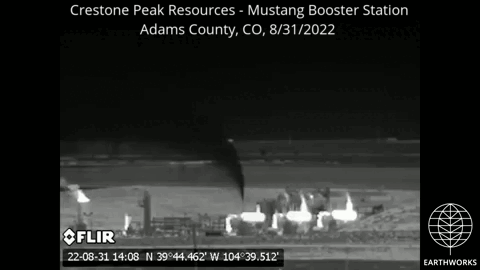
Methane: Industry Initiatives are Failing. Time for Government Action.
The IEA’s latest methane data exposes the failure of industry-led voluntary initiatives to reduce methane emissions.

Methane pouring from oil and gas sites in Colorado seen with Optical Gas Imaging Camera. Courtesy of Earthworks
The world’s energy watchdog, the International Energy Agency (IEA), has called for an “immediate and significant change” in the pace and scale of the oil industry’s action to tackle the potent greenhouse gas methane.
The oil and gas industry has been coming under sustained international pressure to reduce methane emissions from its operations for years. The reason for this is simple: methane, which is responsible for around 30% of the rise in global temperatures since the Industrial Revolution, is over 80 times more powerful than CO2.
The industry says it is solving the problem. But in a severe rebuke of the fossil fuel industry’s spin over substance efforts to tackle the growing methane crisis, the IEA says that the industry is still failing to tackle methane and that greater regulation and oversight are needed.
Releasing its Annual Methane Tracker yesterday, the IEA noted that “methane emissions remained stubbornly high in 2022 even as soaring energy prices made actions to reduce them cheaper than ever”. According to the report, the global energy industry was responsible for 135 million tons of methane in 2022, slightly below the record highs in 2019. Over 60% of this, 82.5 million tons, comes from the oil and gas industry with the rest from the coal and bioenergy sectors. The oil and gas share is the equivalent of about 7.2 billion metric tons of CO2. It’s like the global energy industry put an additional 1,900 coal plants on the planet just for the hell of it.
If that is not shocking enough, all of this waste is still going on despite numerous high profile and richly resourced “initiatives” aimed at addressing the issue. In September 2021, the Biden administration and the European Union announced the Global Methane Pledge (GMP), launched at the COP26 climate talks in Glasgow. Participants joining the Pledge agree to take voluntary actions to contribute to a collective effort to reduce global methane emissions by at least 30 per cent from 2020 levels by 2030. As of November last year, 150 countries have endorsed the GMP, while 50 have developed a methane action plan.
Then there’s the Oil and Gas Climate Initiative, a group of some of the world’s largest oil companies, who claim they have already met their 2025 methane targets ahead of time.
The last couple of years have also seen a massive increase in US gas companies using third-party certification companies, such as Project Canary or MiQ, to sell so-called “responsibly sourced gas”. Such gas is meant to have lower methane emissions.
All of this voluntary industry action is failing to bring down methane emissions despite the IEA’s insistence that this waste can be stopped at very low cost to the industry. IEA Executive Director Fatih Birol says, “emissions are still far too high and not falling fast enough – especially as methane cuts are among the cheapest options to limit near-term global warming. There is just no excuse,”
The IEA argues that methane emissions from oil and gas could be reduced by 75% with existing technologies alone. The fact that the technology is already there highlights “a lack of industry action” on an issue which is “very cheap to address.”
It is not as if the industry is short of money after profiteering from the war in Ukraine. Earlier this month, the NGO, Global Witness, assessed the 2022 annual profits of the five largest integrated private sector oil and gas companies: Chevron, ExxonMobil, Shell, BP and TotalEnergies.
Together their total profits added up to $195 billion in 2022, nearly 120% more than the previous year and the highest level in the industry’s history. So less than 3% of the income accrued by oil and gas companies worldwide last year would be required to invest in technologies needed to achieve the needed methane reductions.
Dr Birol says, “Many companies saw hefty profits last year following a turbulent period for international oil and gas markets amid the global energy crisis. Fossil fuel producers need to step up, and policy makers need to step in – and both must do so quickly.”
The IEA then called for further government market intervention and regulations. This can only be seen as a significant setback for the voluntary methane certification or “responsibly sourced gas” industry. The IEA said: “government policy and regulation will be critical to removing or mitigating obstacles that prevent companies from getting started and going further.”
So it’s clear that we cannot rely on the industry to do the right thing, even when financially incentivized to do so. It’s time for the regulation to step in and quickly. The U.S. EPA has been working on a rule to regulate methane since the beginning of this administration. Those rules need to be finalized quickly and implemented rigorously. The time for industry spin and inaction is over.
